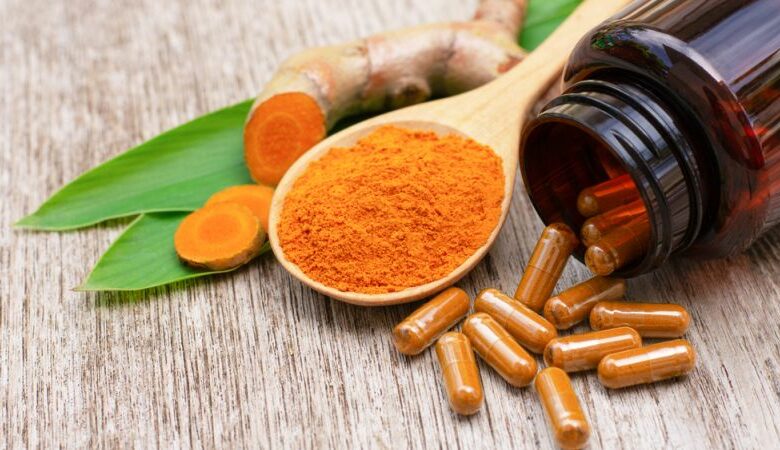How curcumin supplements may help stop macular degeneration

Nutritional supplements that contain curcumin — a natural anti-inflammatory compound — may protect the eyes from the development and progression of age-related macular degeneration, a new study suggests.
The study was published Thursday in JAMA Ophthalmology.
Macular degeneration is the most frequent cause of irreversible vision loss in the developed world. It affects the macula — the center of the light-sensitive retina at the back of the eye — and can cause in blurred vision or a blind spot primarily in people older than 50.
Although no treatments exist to reverse macular degeneration, researchers say some dietary supplements can help prevent the condition from becoming worse.
“Curcumin is the biologically active ingredient of turmeric,” the golden-orange spice used to flavor foods, the study’s corresponding author, Dr. Ehsan Rahimy, an ophthalmologist and adjunct clinical assistant professor in the Byers Eye Institute at Stanford Medicine in Palo Alto, Calif., told UPI.
“We see it promoted as a health supplement in many circles of medicine,” Rahimy said.
In addition to anti-inflammatory effects, the supplement has antioxidant properties, which help shield cells from damage, aging and eventually death, he noted.
While research suggests that genetics, age and smoking play a role in this condition, emerging evidence indicates that “chronic inflammation in the body can contribute to macular degeneration formation and progression,” Rahimy said.
Curcumin comes from the Curcuma longa plant’s root and is used in curry dishes and as a remedy for different afflictions throughout South Asia, according to the study.
To conduct the investigation, researchers compared patients taking curcuma supplements to those who were not. All patients were at least 50 years old and did not have a history of macular degeneration at the study’s start.
The results showed that taking curcuma supplements was associated with a 77% lower risk of developing dry macular degeneration — the most common type. People with a less common type — wet macular degeneration — had a 72% reduced risk of developing the condition.
Among patients who took supplements compared with patients who did not, the results showed a 54% decreased risk of blindness and an 85% lower risk of needing anti-vascular injections into the eye to manage the macular degeneration.
Researchers said they found the results to remain consistent among patients 60 and 70 years old or older.
They collected data from an electronic health records research network in Cambridge, Mass.
This review included 66,804 patients — 65% female, with an average age of 65 — who took prescribed, curcuma-based supplements. For comparison, they included 1,809,440 patients — 55% female, with an average age of 67 — who did not take such prescribed supplements.
When researchers performed additional matching to balance various patient characteristics, this led to further analysis of 66,799 individuals in each group.
“We can gather a lot of unique, real-world insights from studying such large numbers of patients,” Rahimy said. “You’re seeing the forest and not really the trees, and we’re basically looking for interesting trends.”
However, he cautioned that while this research does not prove cause and effect, “it helps support some of the existing studies and literature on this topic, and at the same time, it should hopefully help stimulate or inspire new studies.”
Dr. Flora Lum, clinical spokesperson for the American Academy of Ophthalmology, told UPI that “this is not the type of study that can show the supplements slowed the worsening of age-related macular degeneration — it suggests an association only.” She was not involved in conducting the research.
“More study is needed to validate these findings,” Flum said, voicing concern that the database from which researchers extracted information consists of large institutions. Patients diagnosed with age-related macular degeneration or in more advanced stages may have gone outside this network, she said.
However, “it is the first time a large-scale study like this has been performed looking at association of curcumin and risk of developing age-related macular degeneration and its progression,” said Dr. Swetangi Bhaleeya, an associate professor and director of the retina and uveitis service at the University of South Florida in Tampa.
Even so, the study does not specify which dose or formulation of curcumin patients took and other confounding factors that could have played a role in modifying the risk of disease.
Dr. Judy Kim, a professor of ophthalmology at UT Southwestern Medical Center in Dallas, said with the world’s increasingly older population, “slowing down or preventing diseases that cause blindness due to aging processes will be important.”
Kim recommends an anti-inflammatory and antioxidant diet, along with exercise and abstinence from smoking, especially for patients who are at high risk for age-related macular degeneration or have an early stage of the disease.
“Healthy lifestyle will aid in healthy sight,” she said.










